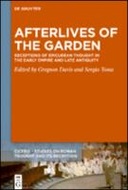Explore

Afterlives of the Garden
0 Ungluers have
Faved this Work
Login to Fave
The collection of essays in this volume offers fresh insights into varied modalities of reception of Epicurean thought among Roman authors of the late Republican and Imperial eras. Its generic purview encompasses prose as well as poetic texts by both minor and major writers in the Latin literary canon, including the anonymous poems, Ciris and Aetna, and an elegy from the Tibullan corpus by the female poet, Sulpicia. Major figures include the Augustan poets, Vergil and Horace, and the late antique Christian theologian, Augustine. The method of analysis employed in the essays is uniformly interdisciplinary and reveals the depth of the engagement of each ancient author with major preoccupations of Epicurean thought, such as the balanced pursuit of erotic pleasure in the context of human flourishing and the role of the gods in relation to human existence. The ensemble of nuanced interpretations testifies to the immense vitality of the Epicurean philosophical tradition throughout Greco-Roman antiquity and thereby provides a welcome and substantial contribution to the burgeoning field of reception studies. ; The collection of essays in this volume offers fresh insights into varied modalities of reception of Epicurean thought among Roman authors of the late Republican and Imperial eras. Its generic purview encompasses prose as well as poetic texts by both minor and major writers in the Latin literary canon, including the anonymous poems, Ciris and Aetna, and an elegy from the Tibullan corpus by the female poet, Sulpicia. Major figures include the Augustan poets, Vergil and Horace, and the late antique Christian theologian, Augustine. The method of analysis employed in the essays is uniformly interdisciplinary and reveals the depth of the engagement of each ancient author with major preoccupations of Epicurean thought, such as the balanced pursuit of erotic pleasure in the context of human flourishing and the role of the gods in relation to human existence. The ensemble of nuanced interpretations testifies to the immense vitality of the Epicurean philosophical tradition throughout Greco-Roman antiquity and thereby provides a welcome and substantial contribution to the burgeoning field of reception studies.
This book is included in DOAB.
Why read this book? Have your say.
You must be logged in to comment.
Rights Information
Are you the author or publisher of this work? If so, you can claim it as yours by registering as an Unglue.it rights holder.Downloads
This work has been downloaded 69 times via unglue.it ebook links.
- 69 - pdf (CC BY-NC-ND) at Unglue.it.
Keywords
- Antike
- antiquity
- Epicureanism
- Epikuräismus
- Ethics
- Ethik
- History of Western philosophy
- Humanities
- Literary studies: classical, early & medieval
- Literary studies: general
- Literature & literary studies
- Literature: history & criticism
- Philosophy
- thema EDItEUR::D Biography, Literature and Literary studies::DS Literature: history and criticism::DSB Literary studies: general::DSBB Literary studies: ancient, classical and medieval
- thema EDItEUR::Q Philosophy and Religion::QD Philosophy::QDH Philosophical traditions and schools of thought::QDHA Ancient Greek and Roman philosophy
- théologie
- Theology
- Western philosophy: Ancient, to c 500
Links
DOI: 10.1515/9783111029733Editions

